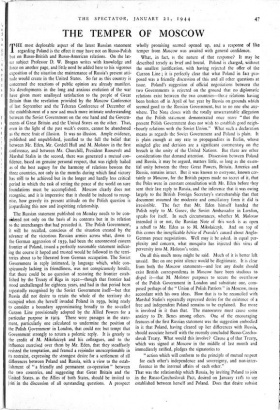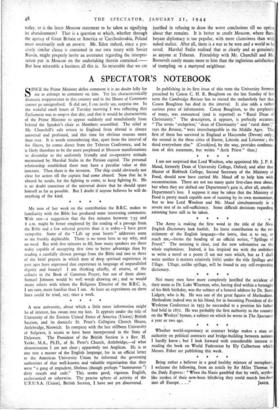THE TEMPER OF MOSCOW
HE most deplorable aspect of the latest Russian statement regarding Poland is the effect it may have not on Russo-Polish but on Russo-British and Russo-American relations. On the lat- ter subject Professor D. W. Brogan writes with knowledge and force on another page, and little need be added here to his vigorous exposition of the situation the maintenance of Russia's present atti- tude would create in the United States. So far as this country is concerned the reactions of public opinion are already manifest. No developments -in the long and anxious evolution of the war have given more unalloyed satisfaction to the people of Great Britain than the revelation provided by the Moscow Conference of last September and the Teheran Conference of December of the establishment of a new and much more intimate understanding between the Soviet Government on the one hand and the Govern- ments of Great Britain and the United States on the other. That, even in the light of the past week's events, cannot be abandoned as the mere fruit of illusion. It was no illusion. Ample evidence, published and unpublished, justified to the full the belief that between Mr. Eden, Mr. Cordell Hull and M. Molotov in the first conference, and between Mr. Churchill, President Roosevelt and Marshal Stalin in the second, there was generated a mutual con- fidence, based on genuine personal respect, that was rightly hailed as of the best augury for the harmony of relations beween the three countries, not only in the months during which final victory has still to be achieved but in the longer and hardly less critical period in which the task of setting the peace of the world on sure fouridations must be accomplished. Moscow clearly does not recognise, and it is imperative that it should be induced to recog- nise, how gravely its present attitude on the Polish question is jeopardising this new and inspiriting relationship.
The Russian statement published on Monday needs to be con- sidered not only on the basis of its contents but in its relation to the interchanges that had preceded it. The Polish Government, it will be recalled, conscious of the situation created by the advance of the victorious Russian armies across what, down to the German aggression of 1939, had been the uncontested astern frontier of Poland, issued a perfectly reasonable statement indicat- ing the course it hoped and trusted would be followed in the terri- tories about to be liberated from German occupation. The Soviet Government in reply intimated, in language which, while con- spicuously lacking in friendliness, was not conspicuously hostile, that there could be no question of restoring the frontier estab- lished by the Treaty of Riga in 1921—though that frontier had stood unchallenged for eighteen years, and had in that period been repeatedly recognised by the Soviet Government itself—but that Russia did not desire to retain the whole of the territory she occupied when she herself invaded Poland in 1939, being ready to consider a boundary approximating broadly to the so-called Curzon Line provisionally adopted by the Allied Powers for a particular purpose in 1919. There were passages in the state- ment, particularly one calculated to undermine the position of the Polish Government in London, that could not but tempt that Government strongly to return a polemic reply. It is greatly to the credit of M. Mikolaiczyk and his colleagues, and to the influence exercised over them by Mr. Eden, that they steadfastly resisted the temptation, and framed a rejoinder unexceptionable in its restraint, expressing the strongest desire for a settlement of all differences between Poland and Russia, with a view to the estab- lishment of " a friendly and permanent co-operation " between the two countries, and suggesting that Great Britain and the United. States, as the Allies of both States, should be invited to join in the discussion of all outstanding questions. A prospect wholly promising seemed opened up, and a response of like temper from Moscow was awaited with general confidence.
What, in fact, is the nature of that response? It may be described tersely as brief and brutal. Poland is charged, without the smallest justification, with having rejected the offer of the Curzon Line ; it is perfectly clear that what Poland in fact pro- posed was a friendly discussion of this and all other questions at issue. Poland's suggestion of official negotiations between the two Governments is rejected on the ground that no diplomatic relations exist between the two countries—those relations having been broken off in April of last year by Russia on grounds. which seemed good to the Russian Government, but to no one else any- where. The Note closes with the totally unwarrantable allegation that the Polish statement demonstrated once more " that the present Polish Government does not wish to establish good neigh,- -hourly relations with the Soviet Union." What such a declaration means as regards the Soviet Government and Poland is plain. It is plain enough at any rate to propagandists in Berlin, whose mingled glee and derision are a significant commentary on the breach in the unity of the United Nations. But there are other considerations that demand attention. Dissension between Poland and Russia, it may be argued, matters little, so long as the esaen- tial unity between the three Great Powers, Britain, America and Russia, remains intact. But it was known to everyone, known cer- tainly to Moscow, for the British papers made no Secret of it, that the Poles were in constant consultation with Mr. Eden before they sent their last reply to Russia, and the inference that it was owing largely to the British Foreign Secretary's statesmanship that that document assumed the moderate and conciliatory form it did is irresistible. The fact that Mr. Eden himself handed the Polish reply to M. Gusev, the Soviet Ambassador in London, speaks for itself. In such circumstances, whether M. Molotov intended it or not, the Russian Note of this week is as open a rebuff to Mr. Eden as to M. Mikolaiczyk. And on top of this comes the inexplicable betise of Pravda's canard about Anglo- German peace negotiations. Well may it be asked, in equal per- plexity and concern, what mosquito has injected this virus of perversity into M. Molotov's veins.
On all this much more might be said. Much of it is better left unsaid. But on one point silence would be illegitimate. It is clear from both the Moscow statements—and lest any doubt should exist British correspondents in Moscow have been studious to dispel it—that M. Molotov purposes to secure the overthrow of the Polish Government in London and substitute one, com- posed perhaps of the " Union of Polish Patriots " in Moscow, more accordant with his own ideas. How that is to be reconciled with Marshal Stalin's repeatedly expressed desire for the existence of a free and independent Poland remains to be explained. But more is involved in it than that. The manoeuvre must cause some anxiety to Dr. Benes among others. One of the encouraging features of the first Russian statement was the suggestion embodied in it that Poland, having cleared up her differences with Russia, should associate herself with the recently concluded Russo-Czecho- slovak Treaty. What would this involve? Clause 4 of that Treaty, which was signed at Moscow in the middle of last month and immediately ratified, pledges the signatories to " action which will conform to the principle of mutual respect for each other's independence and sovereignty, and non-inter- ference in the internal affairs of each other."
That was the relationship which Russia, by inviting'Poland to join in the Russo-Czechoslovak Pact, desired on January 11th to see established between herself and Poland. Does that desire subsist today, or is the latest Moscow statement to be taken as signifying its abandonment? That is a question to which, whether through the agency of Great Britain or America or Czechoslovakia, Poland must necessarily seek an answer. Mr. Eden indeed, since a pre- cisely similar clause is contained in our own treaty with Soviet Russia, might properly invite an assurance regarding the interpre- tation put in Moscow on the undertaking therein contained.— But how miserable a business all this is. So miserable that we cre justified in refusing to draw the worst conclusions till no option about that remains. It is better to credit Moscow, where flam- boyant diplomacy is too popular, with mere clumsiness than with naked malice. After all, there is a war to be won and a world to be saved, Marshal Stalin realised that as clearly and as genuinely as anyone at Teheran. Friendship with Mr. Churchill and Mr. Roosevelt surely means more to him than the inglorious satisfaction of trampling on a martyred neighbour.



























 Previous page
Previous page